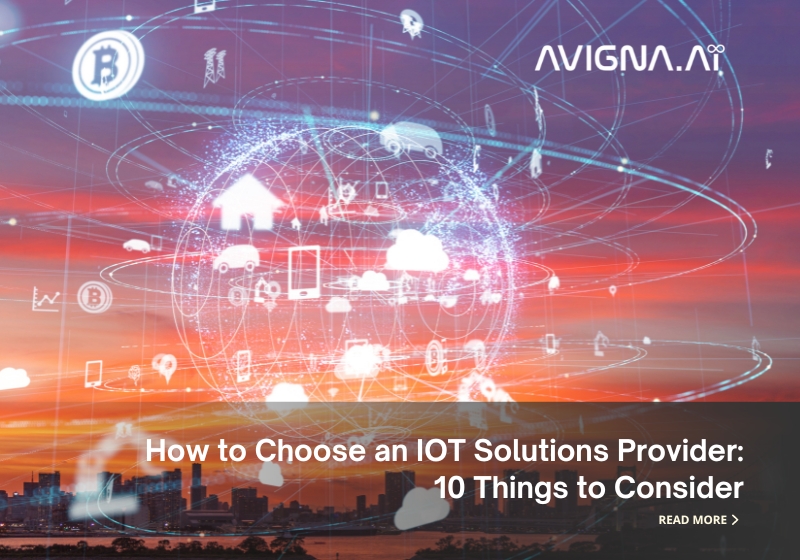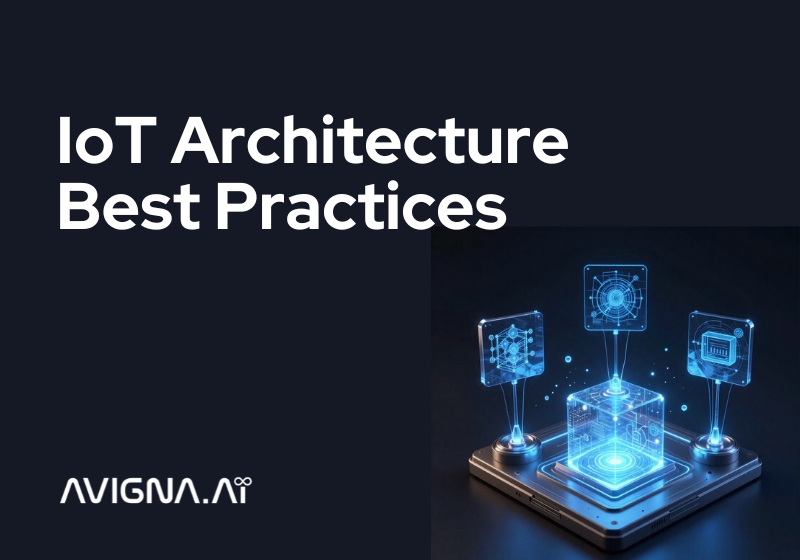How to Choose an IOT Solutions Provider: 10 Things to Consider
We all acknowledge this fact: the IoT marketplace is complex and continuously evolving. New technologies, solutions, and offerings emerge regularly, making it difficult for experienced professionals to stay on top of all the options.
In my observation, with many variables related to your business needs, use cases, budget, timelines, and technical requirements, deciding on an IoT solutions provider without a structured process can result in missed opportunities or potentially damaging mistakes. It is, therefore, essential to keep an open yet discerning mind when evaluating potential partners.
In this article, I will explain the essential factors to consider when choosing an IoT Solutions provider.
Choosing the Best Internet of Things Solutions Company
While negotiating costs is natural, choosing based primarily on price leaves much uncovered. A quality IoT solutions provider must comprehensively address your goals through a nuanced understanding of your operations and a fully integrated approach.
Here are ten essential factors to examine closely in any Internet of Things solutions company before deciding on moving forward with them:
1. End-to-End Solution Evaluation
Instead of piecing together IoT with various best-of-breed vendors, strongly consider an Internet of Things solutions company offering end-to-end capabilities. The risk of integrating individual components from unaffiliated providers includes poor interoperability, increased support needs, and lack of accountability for overall solution performance.
When evaluating potential IoT providers:
- Consider their portfolio – Do they supply devices, connectivity, edge processing, cloud software/services, and business applications?
- Evaluate solution partnerships – If lacking capabilities in-house, do they have formal, well-established relationships with best-of-breed partners?
- Analyze the level of involvement – Will they oversee the full implementation or provide a do-it-yourself kit of disjointed parts?
- Assess value-added services – What services like custom development, integration, and ongoing support do they provide?
Consolidating with a single accountable provider dramatically simplifies deployments while ensuring optimal performance of integrated components within the IoT ecosystem.
2. Domain Expertise Evaluation
You need to understand your unique industry challenges and opportunities better than experienced providers with relevant domain expertise. When evaluating potential partners, scrutinize their:
- Target vertical market(s) – Which industries do they specialize in and have the most success within?
- References from industry peers – Do they cite case studies and customer logos from your market?
- Demonstrated application examples – Can they illustrate specific IoT use cases tailored to your domain?
- Domain-specific certifications – Do they display competence regulations/standards within your field?
- Staff knowledge and experience – Do sales and technical consultants genuinely understand your business environment?
Proven domain expertise helps providers hit the ground running to ensure the fastest path to ROI versus generalized solution providers still ramping up in your industry. Consider this non-negotiable in selecting partners.
3. Flexibility Requirements Evaluation
The business landscape changes rapidly, so choose an IoT Solutions Provider ready to change with you through flexible:
- Software and services – Can solutions quickly scale or shift as needs evolve post-implementation?
- Hardware support – How readily can new or swapped-out devices integrate into the platform over time?
- Connectivity options – Do agreements accommodate adding new technologies and migration between carriers?
- Pricing and contract terms – Are options performance-based, or can custom plans be negotiated long-term?
- Roadmap input – Does the provider invite co-innovation brainstorming to help future-proof your investment?
To future-proof your IoT initiative, select flexible providers open to evolving with the never-ending changes in your organization and technology. This protects long-term value.
4. IoT Security Readiness Evaluation
Security must be table stakes when selecting an IoT Solutions Provider. Scrutinize potential partners’ maturity by examining:
- Certifications and attestations – Which standards do they comply with, and have they undergone audits?
- Infrastructure protections – How do they safeguard devices, networks, and cloud platforms from attack vectors?
- Access controls – What authentication and authorization methods do they leverage?
- Data encryption – What encryption schemes do they use for transit and at rest?
Cyberattacks on IoT organizations are rising, so security depth and continual investment should be non-negotiable deal-breakers when choosing providers. Reputable partners proactively protect your endpoints and data.
5. Data Integration Prowess Evaluation
Valuable IoT data is nothing without insights. Evaluate potential partners’ ability to:
- Onboard different datatypes – How well can they ingest diverse structured and unstructured data?
- Enable real-time analytics – What query methods and reporting tools do they furnish?
- Offer AI/ML services – If lacking in-house, do formalized solution partnerships exist?
Selecting an IoT Solutions Company well-versed in operationalizing IoT data collection and powering valuable downstream insights guarantees solution success.
6. Bandwidth and Connectivity Options
To ensure optimal performance, integrators should offer flexible connectivity tailored to your specific deployment(s). Evaluate:
- Supported protocols – Which standard IoT protocols like LPWAN, cellular, and Wi-Fi do they support?
- Available carriers – Do agreements permit utilizing preferred providers nationwide?
- Throughput capacities – What maximum data loads can protocols like LTE-M and NB-IoT handle?
Diverse, best-fit connectivity forms the backbone, enabling IoT solution success versus frustrations from rigid, ubiquitous options. This flexibility matters tremendously.
7. Pricing Model Assessment
Comparing IoT provider costs requires examining entire lifecycle expenses. Consider:
- Upfront hardware/software fees – What is included in initial CAPEX?
- Monthly access/support costs – What predictable OPEX, like cellular replenishment budgets?
- Professional service rates – What custom work-like integration will require project funding?
- Overages policies – How are charges applied if service usage outpaces allotments?
- Contractual commitments – What volume and term commitments lower unit pricing over time?
Thorough TCO modeling unmasks actual 5-year expenses. Competitively priced partners simplify justifying ROI to stakeholders.
8. Measurable Implementation Timelines
When pursuing an IoT initiative, time-to-value matters tremendously. A key differentiator amongst IoT Solutions Companies involves predictable implementation roadmaps complete with the following:
- Pilot project durations – What typical timeframes do proof-of-concepts require?
- Complete deployment estimates – What milestones and durations can be expected for full rollouts?
- Contingency buffering – How do they account for potential setbacks in scheduling?
Thorough scoping discussions should provide measurable timelines, including 10-20% contingency to assuage unrealistic forecasts. Opt for partners with proven track records of rapid deployments.
9. Strategic IoT Consulting Services
Distinguishing top providers involves value-adds beyond standard offerings. Inquire about optional strategic services like:
- IoT Maturity Assessments – Do they offer readiness evaluations to identify high-impact use cases?
- Technology Road mapping – What expertise and workshops do they contribute to long-term planning?
- Business Case Development – How do they assist with ROI modeling and stakeholder buy-in efforts?
Realizing ROI necessitates strategic guidance accelerating tangible benefits. Proactive advisory reflects dedicated solution accelerators.
10. Support Commitment Evaluation
Even when expert providers aid, IoT solution management involves inherent complexities requiring scalable support. Assess potential partners:
- First-line support models – What combination of phone, email, ticketing, and community forums do they utilize?
- Escalation/emergency processes – How do issues progress if unresolved, and what SLA commitments exist?
- Online knowledge hubs – What searchable product documentation, tutorials, and FAQs do they provide?
- Professional services availability – Which packaged and custom support offerings like training are included?
Comprehensive, global support capabilities assuage risks and simplify operations as IoT inevitably encounters issues requiring fast resolution. Scrutinize this commitment deeply.
Choose a Strategic Partner, Not Just a Vendor
Choosing the right IoT Solutions Company involves carefully considering these critical decision factors. While no partner excels across the board, prioritizing must-have criteria like scalability, security, and domain expertise simplifies choices. Comparing multiple finalist options against your unique needs guarantees the optimal partner emerges to power your IoT-driven digital transformation. Starting deployment conversations sooner ensures smoother integrations and accelerated time-to-value.
At Avigna, we strive to offer excellence in every step of IoT Consultation, Services, and Solutions.
To learn how we help our customers make more on their IoT investment, email us at queries@avigna.ai.
Follow us on LinkedIn. Subscribe to our Newsletter to receive regular updates.



